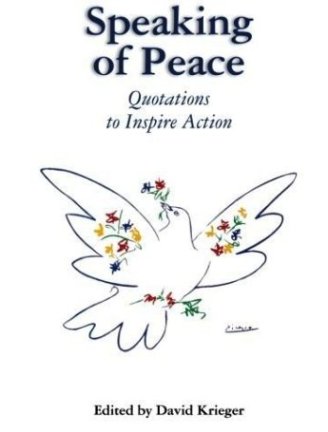19th century American writer, artist and philosopher, Elbert Hubbard, wrote that “Every man is a damn fool for at least five minutes of every day; wisdom consists in not exceeding the limit.”

That’s certainly one limit that I strive to achieve.
However, true wisdom comes slow to most of us. For me, it’s comes at the crossroads of knowledge, experience, right and wrong. Sometimes, it involves pain, loss or both.
“In the aftermath of the bombings of Hiroshima and Nagasaki,” peace activist David Krieger writes, “President Truman’s Chief of Staff, Admiral William D. Leahy, lamented, ‘I was not taught to make war in that fashion, and wars cannot be won by destroying women and children.’ But that is exactly what wars do…”
In his new book, Speaking of Peace – Quotations to Inspire Action, Krieger has collected wisdom from the great souls of the planet; wisdom that most of the current inhabitants would do well to return to and reflect upon.
Perhaps the poet Maya Angelou was inspired by 19th century philosopher George Santayana who wrote, “Those who cannot remember the past are condemned to repeat it,” when she dug deeper to write, “History, despite its wrenching pain, cannot be unlived, but if faced with courage doesn’t need to be lived again.”
Krieger sees the same power and purpose in words that I do.
“The world is over-armed and peace is underfunded,” writes South Korean diplomat and United Nations Secretary-General Ban Ki-moon.
In a chapter on responsibility, I’m reminded of the wisdom from a distant past…
“It does not matter how slowly you go,” Chinese philosopher Confucius says, “as long as you do not stop.”
…as well as the present…
“If I have to recapitulate in a few words what I feel is the most important commandment for our generation,” Nobel Peace Laureate Elie Wiesel writes, “it is to fight indifference. Whatever happened, happened not only because the killer killed, but because the world was indifferent.”
Divided into chapters covering the Lessons of History, War, Peace, Nuclear Weapons/Nuclear War, Earth Citizenship, Human Spirit, Commitment to Life, Individual Power, Individual Responsibility and Hope, Krieger has synthesized the critical issues that affect us all and utilizes the wisdom of poets, leaders, doctors, historians, judges, generals, economists, educators, philosophers; black, white, brown; American, French, Indian, Greek; Jewish, Christian, Buddhist, Taoist… all speak to who man is and what he is capable of.
“It is not because things are difficult that we do not dare,” Roman philosopher and politician Seneca wrote, “it is because we do not dare that things are difficult.”
When was the last time you heard wisdom like that from a politician?
“Our lives begin to end,” writes Martin Luther King, Jr., “the day we become silent about things that matter.”
Speaking of Peace includes the Bertrand Russell-Albert Einstein Manifesto which addresses the dangers of Nuclear War, a document signed by scientists and intellectuals of the 1950’s; as well as President Kennedy’s Commencement Address at American University speaking on the same threat in 1963. And finally, a document I had not encountered before: the Declaration on the Right of Peoples to Peace put forth by the United Nations.
Speaking for Peace – Quotations to Inspire Action may only be 124 pages, but it speaks volumes on what we need to think about most if we want to bring about the change necessary for a real and lasting peace.
“Real generosity toward the future lies in giving all to the present.”
– Albert Camus, French author and Nobel Laureate
Comments










